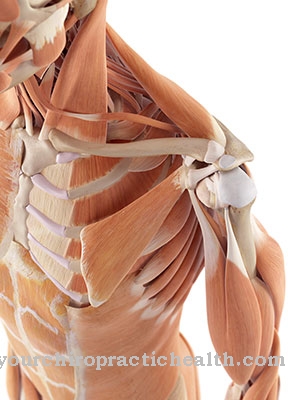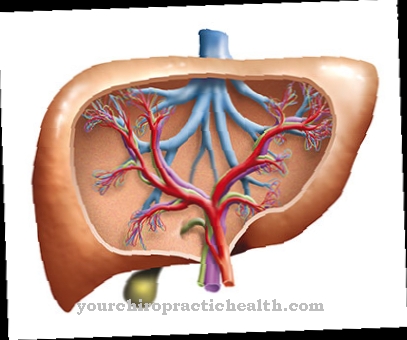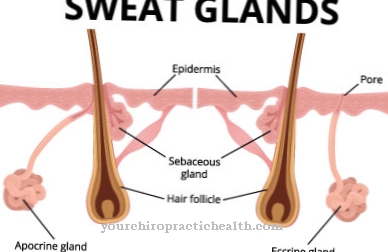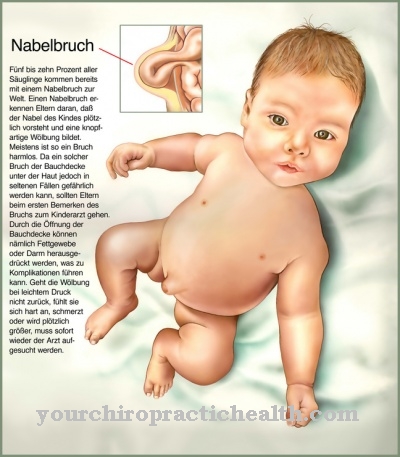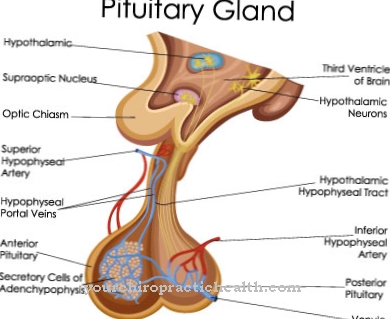hepatitis is generally an inflammation of the liver (Inflammation of the liver) by disrupting or damaging liver cells. This impairment of the liver by hepatitis pathogens must be reported. More specifically, hepatitis is divided into hepatitis A, hepatitis B, hepatitis C, hepatitis D, and hepatitis E.
What is hepatitis?

© joshya - stock.adobe.com
Hepatitis is a form of liver disease. The liver is considered to be the largest of the organs in the human body and is one of the most important organs when it comes to detoxifying food, pollutants and other waste products. When the liver is inflamed, it is called hepatitis.
The origin of the term hepatitis comes from the Greek and is made up of the compound terms hépan = liver and the word itis = inflammation. Hepatitis can damage the liver cells and thus disable the liver's most important function, namely the filtering of harmful substances.
causes
Hepatitis can be attributed to several factors. Viruses, bacteria or different types of parasites can be decisive for a hepatitis disease. Various diseases such as sarcoid or autoimmune diseases can also lead to hepatitis. Another factor that can lead to hebatitis is the excessive consumption of alcohol or medication.
Various chemicals can also lead to the outbreak of the disease. Most hepatitis diseases are usually caused by different types of viruses. A distinction is made between five different types of viruses. These five types of viruses are common to most people with hepatitis. A distinction is made between the hepatitis A virus (HAV), hepatitis B virus (HBV), hepatitis C virus (HCV), hepatitis D virus (HDV) and the hepatitis E virus (HEV). Hence the various forms of hepatitis are derived.
In medicine, a distinction is made between hepatitis A, B, C, D or E. Another virus that belongs to the same virus group is the hepatitis G virus, which, however, is not recognized as an independent virus disease, but rather than a minor virus. Depending on the inflammation of the liver, different symptoms can occur.
Symptoms, ailments & signs
Hepatitis can manifest itself through very different symptoms. In some patients, the inflammation of the liver becomes severe. Others, on the other hand, feel no discomfort and the disease is diagnosed by chance. In the case of acute hepatitis, different symptoms can occur in the individual phases.
In the early phase, symptoms such as nausea and vomiting, loss of appetite and fever appear. There is also upper abdominal pain and joint or muscle pain. The patients usually complain of an altered or weakened sense of smell and taste. In the jaundice phase, which occurs after two to eight weeks, the typical yellowing of the skin or the eyeball occurs.
In this phase the stool is almost colorless and the patient feels increasing itching in various parts of the body. Symptoms such as tiredness, weakness and exhaustion appear during the recovery phase. The recovery phase can last several weeks to months. Chronic hepatitis causes tiredness, loss of appetite and decreased performance.
Typical physical symptoms are tenderness under the right costal arch, joint pain, and diarrhea. In men, testicular atrophy and enlargement of the mammary glands can occur. Menstrual cramps often appear in women. In the chronic form, the symptoms appear in episodes.
course
As a rule, hepatitis always begins with somewhat more harmless general symptoms. Often the affected person shows signs such as tiredness or nausea. Characteristic symptoms can also appear later. Typical of a hepatitis disease are, for example, discoloration of the skin or discoloration within the eye (e.g. yellow).
In hepatitis, a distinction is not only made between the individual types of virus, but also between the reasons for the transmission. For example, smear infections are responsible for hepatitis A and hepatitis E. These usually occur then on when pathogens are excreted and later return to your own organism.
The course of the disease usually sounds after a few weeks or months. With chronic hepatitis, the disease often only subsides after six months. A hepatitis disease is always positive in most cases, but if you have hepatitis, you have to report it, as hepatitis falls under the Infection Protection Act.
Complications
The hepatitis can take different courses. Depending on the type of hepatitis disease, spontaneous healing, but also chronic courses can take place. Hepatitis A and hepatitis E both heal spontaneously without any consequences, while with hepatitis B or especially with hepatitis C the course can become chronic. A chronic course leads to a severe impairment of the quality of life for the person affected.
This can lead to depression and certain addictive behavior, which can make the hepatitis worse. In the worst cases, liver cirrhosis develops. In this, the liver is remodeled like a nodule, and the person concerned usually complains of pain in the upper abdomen.
But edema and coagulation disorders are also observed, as the liver is no longer able to properly synthesize the proteins it needs. Due to the cirrhosis of the liver, the spleen is usually enlarged at the same time, as the blood is diverted there from the liver. This causes additional pain. Additional bypass circuits are found in the veins in the stomach and esophagus.
Varicose veins develop there, which can burst and thus lead to internal bleeding. In the rectum area, hemorrhoids also develop due to the diversion. In addition, the liver does not detoxify the ammonia, which can accumulate in the blood and lead to encephalopathy.
When should you go to the doctor?
If symptoms such as loss of appetite, stomach pain, tiredness, or fatigue are noticed, you may have a hepatitis infection. A doctor should be consulted if the symptoms persist for more than a week or if they increase in intensity within a short period of time.
If there are additional symptoms, medical advice is also required. Liver problems such as a change in the color of the urine or stool and signs of blood poisoning should be clarified immediately. An emergency doctor must be alerted if the fever rises above 41.3 degrees Celsius.
The same applies to serious cardiovascular problems such as a heart attack or a circulatory collapse. A hepatitis infection definitely requires a medical diagnosis and treatment. That is why you should see your family doctor if you suspect it.
This is especially true if the symptoms can be traced back to a specific cause. If the symptoms mentioned occur, for example after unprotected sexual intercourse or contact with a possibly infected person, a doctor should be contacted immediately. In case of doubt, the emergency medical service can be contacted first.
Doctors & therapists in your area
Treatment & Therapy
Treatment for hepatitis is different and depends largely on the type of virus. In the case of hepatitis A, hepatitis D and hepatitis E, efforts are primarily made to combat the symptoms, as there is no effective drug against the various types of virus.
As a rule, you should eat a low-fat, high-carbohydrate diet for these types. In the case of hepatitis B, however, interferon alfa therapy is used in most cases, which is intended to prevent a chronic course. Treatment of hepatitis G, on the other hand, is not absolutely necessary, since in most cases it disappears again without any effects.
Outlook & forecast
The prognosis of hepatitis depends on the type of illness and the use of medical care. Without treatment, the virus usually continues to spread unhindered. The course of the disease can be chronic and the risk of premature death is significantly increased.
With hepatitis A the patient has a good chance of a cure. With sufficient rest and drug treatment, the patient will be released from the treatment as cured within a week. Consequences are not to be expected. In addition, the affected person becomes immune to the virus for life.
In the case of hepatitis B disease, there are basically also good prospects of recovery. In addition, it can also lead to a chronic course of the disease. The patient is at risk of long-term effects. Liver cirrhosis or liver cancer is a life-threatening condition. Organ failure can result in death.
In the case of hepatitis C disease, there is a cure with early treatment. The sooner the patient seeks medical care, the better the prognosis. Hepatitis is responsible for liver cancer in over 50% of cases. If the person concerned consumes alcohol or leads an unhealthy lifestyle, the chances of a cure decrease immensely.
Aftercare
Anyone who wants to prevent hepatitis from recurring should get vaccinated. Effective protection can be built up against forms A and B. Due to the mostly favorable prognosis and the rapid course of the disease, long-term follow-up examinations are not necessary in the case of acute symptoms.
A person concerned only turns to a doctor if the symptoms recur. Adequate hygiene, a balanced diet and a healthy weight prevent re-infection. A strong immune system can defend itself against infection. In hepatitis, the liver is particularly affected.
If the disease is chronic or if the patient has consumed excessive alcohol, long-term damage is not uncommon. Then regular checks are recommended. Blood tests, tissue samples and ultrasound images provide clarity about the progress of the disease. Medicines often complement a therapy.
All aftercare measures aim to make the everyday life of a patient bearable in the case of chronic hepatitis. It is important to find the right dose depending on the extent of the symptoms. The monitoring may be used to decide whether to have a liver transplant. Chronic illness can lead to liver cancer. This complication can be fatal and require additional extensive treatment.
You can do that yourself
An existing hepatitis illness should be treated by a specialist, since a chronic course can develop if it is not treated or if it is purely self-treatment. There is also the risk of life-threatening complications. The treatment and also the measures that those affected can take themselves depend on the cause of the disease.
Hepatitis can develop, for example, as a result of medication or alcohol abuse. In this case, a new drug setting should be discussed with the attending physician and alcohol should be strictly avoided.
If there is already an addiction disease, the medically supervised withdrawal therapy and self-help groups are a possible treatment. Since most hepatitis diseases are of viral origin, the treatment focuses on symptom relief. Depending on the type of virus, the infections heal by themselves or are accompanied by medication.
Since the liver is stressed and damaged in all cases, those affected should ensure a low-fat, high-carbohydrate diet. A high level of fluid intake - no alcoholic or sugary drinks - and adequate sleep are also beneficial. Regular exercise in the fresh air also strengthens the immune system and stimulates the metabolism.
A strong defense is essential in fighting infectious diseases. The body can also be supported in detoxification: through the targeted supply of minerals and lots of fresh vegetables. This balances the acid-base balance and helps the body to remove pollutants better.

